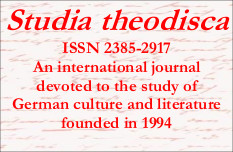Hölderlins «Antigonä»: Übersetzung als Kulturrevolution. Philologische Anmerkungen zum Verhältnis von Musik und Politik bei Hölderlin
DOI:
https://doi.org/10.13130/1593-2478/11153Abstract
Music (in the Attic sense of musiké) and politics are intimately connected in Hölderlin’s thinking. Musiké organises the rhythm of ideas («Rhythmus der Vorstellungen») in the tragedies of Sophocles by integrating the different competencies of humans. Nevertheless, Hölderlin’s translation of Sophocles aims not at a rewriting of musiké to compensate for the deficits of the French Revolution (cf. Herder, Schiller or Hegel). Rather, he acknowledges the fact that an open society consists in a permanent struggle for translation. Even this society is not to be abstracted from the concrete “musical”, i.e. metric and prosodic, features of translation. The paper focuses on Hölderlin’s use of polymetric features in anticipation of a society that will no longer be “narratable”.Downloads
Download data is not yet available.
Downloads
Published
2019-01-22
How to Cite
Sinn, C. (2019). Hölderlins «Antigonä»: Übersetzung als Kulturrevolution. Philologische Anmerkungen zum Verhältnis von Musik und Politik bei Hölderlin. Studia Theodisca, 3, 99–116. https://doi.org/10.13130/1593-2478/11153
Issue
Section
Essays







